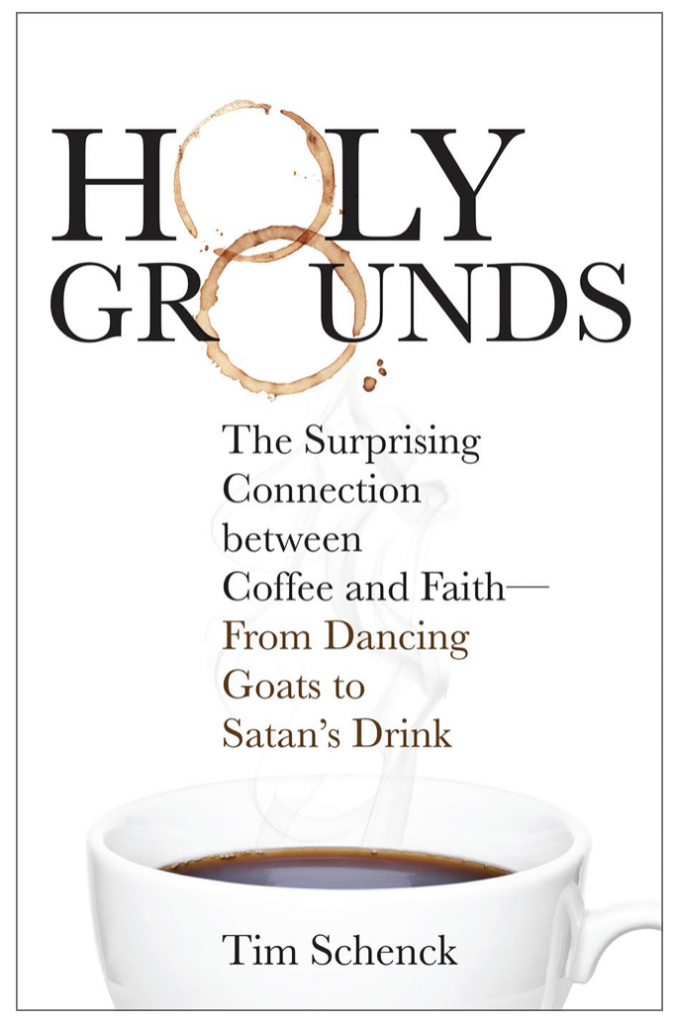I’ve been a coffee enthusiast since ninth grade when a coffee shop opened in my tiny town and became the new (and pretty much only) hangout spot. I was immediately hooked. By the time I got to seminary, my love of coffee had only grown and my coffee consumption began to mirror the rhythm of my prayer life. Each day was a pattern of chapel, coffee, class, chapel, coffee, class. As I ventured into ministry, coffee became the backdrop for so many important moments. Over cups of coffee, I’ve listened as church members shared their deepest joys and I’ve offered counsel to those who are struggling. It’s hard to imagine what my ministry would look like without coffee. For these reasons, I was thrilled when I learned about Holy Grounds: The Surprising Connection between Coffee and Faith— From Dancing Goats to Satan’s Drink, a forthcoming book by Tim Schenck, a priest in the Diocese of Massachusetts who is perhaps best known as founder of Lent Madness.
Holy Grounds is part historical exposition, part theological reflection, and part personal narrative, all tied together with a healthy dose of humor. Schenck explores not only coffee’s religious heritage as he examines its relationships with Islam, Christianity, and Judaism, but he also explores its geographic heritage and shares technical information about varieties of coffee and different ways of brewing. The sections of the book covering this information are fairly detailed while still being accessible; after reading this book, I felt more knowledgeable walking into my local coffee shop and understanding the different types of coffee and the various coffee paraphernalia for sale.
While I enjoyed learning about the history of coffee, particularly its religious roots, the most compelling parts of the book were when Schenck shared his own literal and figurative journeys as a coffee drinker.
Throughout Holy Grounds, Schenck weaves in his personal coffee-related stories in a way that invites readers to reflect on our own memories and experiences of becoming coffee drinkers. He brings along readers as he visits coffee-roasting monks in Pennsylvania and sips espresso in Italy. He also takes readers on a trip to a Nicaraguan coffee farm, inviting us to reflect on where our coffee originates. He explains the process by which we get our coffee, from planting to brewing, and explores the ethical ramifications of coffee production and consumption, including the Fair Trade movement. If you’ve never stopped to think about where your coffee comes from, you will after reading this book.
Schenck also brings along readers as he visits the Seattle headquarters of Starbucks. Although he acknowledges that Starbucks is a polarizing brand, he asserts that Starbucks has had an invaluable cultural influence by designing their stores to be gathering places where people can come together not only for coffee but to also experience and build community.
This emphasis on community is at the heart of Holy Grounds. Schenck, who understands coffee as being sacramental (and shares the joke about coffee being the eighth or, depending on your piety, third sacrament), writes,
“If a sacrament is an outward and visible sign of an inward and spiritual grace, coffee fits the description. It binds communities together in ways that books, even the most sacred books, sometimes fail to do, because coffee fosters relationship. And relationship—with the divine and one another—is the bedrock of a faith community” (198).
As I read Holy Grounds, it was impossible not to think about the ways this seemingly ubiquitous beverage has helped enrich my life and faith communities. Yet the book won’t simply leave readers feeling warm and fuzzy about the ways coffee brings us together; the book also leaves readers considering the impact of our coffee consumption through the lens of our Christian responsibility to care for other people and for the environment.
You don’t have to be a coffee connoisseur to enjoy this book, although liking coffee might help you enjoy it more. This is a particularly great read for coffee enthusiasts and those interested in the intersection of food or drink and faith; it would also be a fun book to read with a group. Whether you read this book alone or with a group, though, make sure you have a cup of coffee in hand because otherwise you will have to take a break from reading to brew yourself a cup.
Holy Grounds: The Surprising Connection between Coffee and Faith—From Dancing Goats to Satan’s Drink is forthcoming from Fortress Press and will be released April 2, 2019. It is currently available for pre-order in paperback and for Kindle.
The Rev. Jordan Trumble is Priest-in-Charge of Christ Church in Fairmont, WV and is a contributing editor for Episcopal Café. She can regularly be found drinking coffee at her favorite local coffee shop and pottery studio, Joe N’ Throw.

